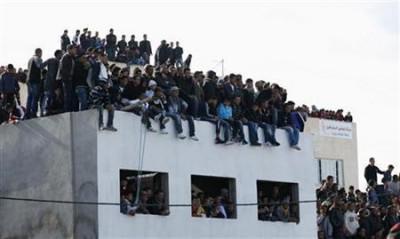
People gather in Sidi Bouzid during a ceremony marking the first anniversary of the Tunisian Revolution. (Reuters)
On Saturday, tens of thousands of Tunisians descended upon the main square of a small town credited with giving birth to a big movement with the potential to change the world.
In Sidi Bouzid, a city now known for its protests, they gathered to celebrate, waving flags and listening to music. Moncef Marzouki, Tunisia’s brand new president, spoke at the celebration, crediting the city with “restor[ing] the dignity of all Tunisians.”
One year before, a 26-year-old vendor, who had sold fruit for 14 years in order to support his family of seven, committed suicide. On that morning, local officials had accused him of evading an arbitrary fine, confiscated six crates of his fruit and his electronic scale, slapped him in the face, and denied him any appeal. Mohammed Bouazizi doused himself in paint thinner, took his place in front of a local government office, and lit himself on fire.
A recent article by Peruvian economist Hernando de Soto, president of the Institute for Liberty and Democracy (ILD), sheds light on the roots of a frustration in Bouazizi that many would find inconceivable. According to de Soto, Bouazizi was a “repressed entrepreneur” who dreamed of accumulating the capital to buy a truck that would allow him to purchase and transport his fruit directly from farmers and secure a permanent place in the wholesale fruit market.
For years, Bouazizi’s dream was consistently thwarted. Lacking collateral, he could not secure the loan he needed to buy a truck and grow his business. Worse, absent formal recognition by the state, Bouazizi’s business remained ever vulnerable, relying on an informal agreement in which Bouazizi paid three dinars a day and submitted to a continual demand for bribes from local officials in exchange for a spot on the street in which to park his fruit cart.
According to de Soto, had Bouazizi tried to formalize and secure his business by establishing a sole proprietorship, he would have had to spend 142 days completing 55 administrative steps at a cost of $3,233, or 12 times his monthly income. When local officials confiscated Bouazizi’s goods and capital and challenged the informal agreement that allowed him access to consumers, they not only crushed his dream of prospering but also threatened his ability to survive and provide for his family.
That the anniversary of this gruesome act is cause for celebration in Tunisia and much of the Arab world is a testament to the remarkable promise of the year that has transpired. After nearly a quarter of a century in the position, Zine El Abidine Ben Ali is no longer president of Tunisia. For perhaps the first time in its history, the country’s citizens have chosen their leaders in elections widely regarded as both free and fair.
In Egypt and Libya, longtime leaders Hosni Mubarak and Muammar Gaddhafi rule their people no more. In Yemen, President Saleh has signed an agreement that may make his departure from power imminent. In Jordan and Morocco, monarchs have pledged to share power more generously through programs of constitutional reform. In Syria and Bahrain, longtime leaders have been challenged. Even in the Arab Gulf, where prosperity often insulates leaders from political pressure, some have taken tentative steps to reform. Despite the challenges posed by the so-called Arab Spring, it appears that Arab nations have never been closer to realizing the freedom, dignity, and opportunity that they seek.
Still, it remains to be seen whether nascent institutions and emerging leaders will be able to deliver better lives for people with whom Bouazizi’s frustrations resonated so deeply. Many in the Arab world have shared and continue to share Bouazizi’s precarious position. The ILD estimates that 50 percent of entrepreneurs in the region operate outside the formal economy. A 2004 ILD study estimated that in Egypt the informal sector employs more people than the legal private sector or the public sector and that the value of these informal businesses exceeds that of the Cairo Stock Exchange by 30 times.
Unfortunately, elections alone cannot deliver these millions from stagnation, indignity, and vulnerability. Rather, comprehensive governance and regulatory reform is needed to grant millions of people an opportunity to do better than survive. A good starting point may be creating incentives and lowering the barriers to participation in formal economies for the millions of entrepreneurs that have sympathized with Bouazizi’s hopelessness.
The dividend to increased formal economic participation can be substantial and immediate. In the 1980s, de Soto and the ILD launched a program of economic reform agenda-setting and advocacy in Peru. As a result of their efforts and the more inviting regulatory environment that was created, the number of days needed to navigate the bureaucratic obstacles to starting a formal business dropped from nearly 300 to less than one. More importantly, 380,000 businesses entered the formal economy, offering more than 500,000 Peruvians a clearer path to prosperity.
Similar reform in the Arab world could alleviate frustration, create desperately needed jobs, and instill confidence in transitions to democracy. One year into the Arab Spring, there are certainly many reasons to celebrate. Yet, until Arab societies can create an environment that extends entrepreneurs an opportunity to transcend the vulnerability and frustration that plagued Bouazizi, there will remain large segments of the population in no position to celebrate.

